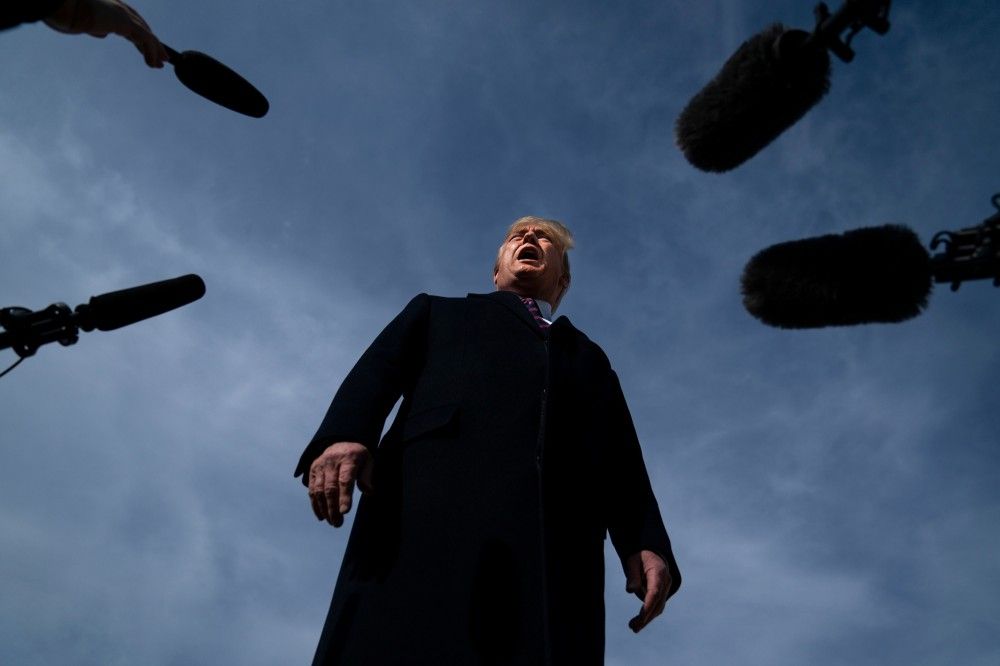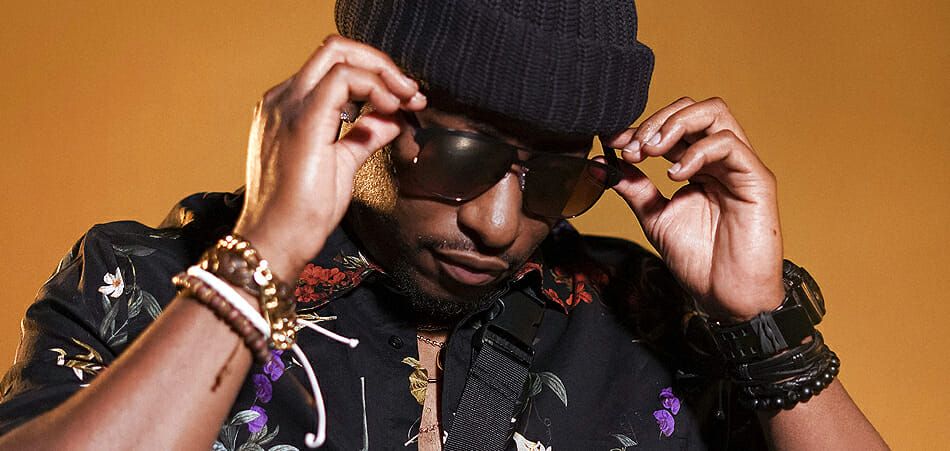
Welcome to the Trumpocalypse
had such high hopes for Easter. So high, in fact, that when he burst forth on Fox News a couple of weeks ago with his idea of “re-opening” the country wide this coming Sunday, he gave it an exemplary rating of three “beautifuls”: “I just thought that it was a beautiful time … a beautiful timeline. It’s a beautiful day.”
You could close your eyes and easily imagine what the president was envisioning: At a time of his appointing, on Easter Sunday, shop doors would be flung open simultaneously across America to great cheers. The people singing hymns in “packed churches” would turn their minds and hearts toward Trump and the miracle he’d wrought. Next morning, the stock market would rise like Jesus. And so it would come to pass that this Easter — Trump’s Easter — would be even bigger than the original.
The whole doomed idea apparently had a divine origin of sorts. Reportedly, the president had begun to view the Christian holiday as his best chance at resurrecting his reelection hopes, with one grand spectacle, while watching one of his “faith advisers,” the Rev. Franklin Jentezen of Gainesville, Ga., preach online to a vast, near-empty sanctuary in mid-March, on the Sunday Trump had designated as a National Day of Prayer for “healing” .
Franklin, to his credit, wasn’t among the leading Trump-vangelicals who waved off social-distancing recommendations and urged their parishioners to show up, shake hands and demonstrate, in the words of South Florida’s Rodney Howard-Browne, that they weren’t “pansies.” But Franklin’s message was right in tune with that of the president he’d declared born again in 2016, along with the rhetoric of the whole coterie of religious grifters and hangers-on that Trump has embraced as some of his closest allies. In his sermon, titled “Choose Faith Over Fear,” Franklin urged his viewers, “Don’t let worry make you go into a panic.” After reminding them that the virus was no match for “the healing, miraculous, powerful God that we serve,” Franklin promised: “No weapon formed against us will prosper.”
Trump, who’d been full of faith-filled reassurances that the virus would simply “go away,” couldn’t have said it better. The pastors and telepastors were not just echoing Trump’s message, but turning it into a dangerous Christian rallying cry for the Twitter age: “#FaithOverFear.” And it was no wonder that the three core planks of Franklin’s message—starting with the importance of downplaying the importance of the pandemic—spoke so powerfully to Trump. Alongside denialism as a form of reassurance, there was the conviction that we are special, that “real” Christians can’t be touched by the virus, any more than the president believes he can. And of course, there’s the paranoid turn in the idea that the has been aimed specially at us. It’s a plot against Christians just like it’s a conspiracy to take down Trump.
Leave it to Jerry Falwell Jr. to knit those strands together. In a March 13th interview on Fox & Friends, Falwell lamented the “hype” and “overreacting” about the threat, then said the liberal media might be spinning it up for a political reason: “You know, impeachment didn’t work, and the Mueller report didn’t work, and Article 25 didn’t work, and so maybe now this is their next, ah, their next attempt to get Trump.” (Falwell, of course, demonstrated “faith over fear” in action by inviting Liberty University students back to campus after spring break, with predictable results.)
A lot of people still marvel at the devotion conservative evangelicals and charismatic Christians have shown to Trump. How could they (repeat after me) support and even worship a twice-divorced vulgarian greedhead who can’t correctly pronounce II Corinthians, can’t distinguish an offering plate from a communion plate, and appears to use the Seven Deadly Sins as a daily to-do list? Or a person who, in the present crisis, shows so little human empathy, so little evident concern for human lives and suffering?
But as the coronavirus has shown, this lingering confusion is based on an antiquated idea of what many Christian conservatives believe and value. “We still buy the line that the Christian right is just an interest group working to protect its values,” as religious journalist Katherine Stewart wrote at The New York Times in late 2018. But, as she noted, “This isn’t the religious right we thought we knew. The Christian nationalist movement today is authoritarian, paranoid and patriarchal at its core. They aren’t fighting a culture war. They’re making a direct attack on democracy itself. They want it all. And in Mr. Trump, they have found a man who does not merely serve their cause but satisfies their craving for a certain kind of political leadership.”
We’re constantly underestimating the centrality of Christian nationalism to Trump’s presidency. It’s true that Trump cannot spout scripture like a Mike Pence, or explain why catering Middle East policy to Israel helps speed us toward the Apocalypse like a Mike Pompeo, or cite selected verses and chapters to explain why homosexuality is marking America for God’s retribution like the White House’s Bible study pastor, Ralph Drollinger. But Trump gets these people and their brutal, zero-sum view of the world — and vice-versa. For starters, the universe is divided neatly into friends, who must constantly prove they’re really friends, and mortal enemies, who must be trampled. Also, of course, the truth that he knows, like the truth they know, is the only truth, even if it’s often subject to revision. And just as the world is out to get them, it’s out to get him. What’s often painted as a marriage of convenience between Trump and the religious right is far closer to a pure love match. When Pence fixes those doe eyes upon his president, he isn’t just kissing up; he means it.
It’s perhaps no surprise that Trump put Pence, one of the most anti-science politicians on the planet, in charge of his COVID-19 response. (Or that one of Pence’s first acts was to lead the task force in performative prayer, with cameras rolling.) The great unwritten story of Trump’s presidency is the extent to which it’s dominated by End-Times Christians. Like Secretary of State Pompeo, the vice president — along with at least four other Cabinet members and Chief of Staff-in-waiting Mark Meadows — believes we’re in the bloody final period of history before Jesus Christ returns to vanquish Satan.
While the media typically just uses the euphemism “Christian” to describe such beliefs, these folks are Christian nationalists, who view the second coming of Christ as an event in which America will play a leading role, thanks to its founding as a “Christian” nation and its Judeo-Christian principles. They’re also known as Rapture Christians, thanks to their conviction that before things start to get really ugly on the earth, with God-sent wars and plagues far worse than COVID-19, they’ll be wafted up to heaven en masse, to live in eternal peace, bliss, and moral superiority while everyone else — including lesser Christians — suffers years’ worth of unspeakably gruesome torments prior to the final, earth-destroying battle between Warrior Jesus and Satan at Armageddon, and the Final Judgment in which Jews and others who refuse to convert are condemned to eternal torture in hell. (There are different timelines and versions, and end-time predictions are always evolving, but this one is currently most in vogue.) As Pompeo put it, in a Kansas church in 2015, the future looks like a “never-ending struggle … until the Rapture. Be part of it. Be in the fight.”
It’s all a pretty far cry from the “good news” of the New Testament Gospels, a long way from gentle Jesus with his “blessed be the peacemakers” preachments. For End Timers, the key scriptures are not the Gospels at all, but a collection of Old Testament prophecies, the Bible-ending Book of Revelation, and (purporting to explain it all in contemporary terms) the best-selling fictional series Left Behind, supplemented by various visions of self-proclaimed prophets. You know, like the ones who, around the time that Trump sewed up the Republican nomination in 2016, began to hear from God that he was anointing the reality-show star as a 21st-century version of an Old Testament “pagan king,” placed in the White house to help speed events along toward the Apocalypse. (Pompeo himself endorsed this idea of Trump as a god-sent “king” in an interview with the Christian Broadcasting Network.)
Now, their pagan king is leading us through an actual Biblical-sized plague — with the guidance of End-Time Christians. And while evangelical leaders have echoed Trump’s messaging — don’t worry, a strongman (or God) will save you — he’s also borrowed from theirs, promising of the virus early on, “It’s going to disappear. One day it’s like a miracle, it will disappear.” Trump-vangelicals’ talk about red states being “exempt” from the virus, while demon-possessed “blue cities” suffered the wrath of God, crept briefly into his talking points. And he crept into theirs: The virus “will come and it will go,” wrote Landon Stradlin, an evangelical music minister who’d been tweeting about how the virus was being used as a tool against Trump—right up until he became one of the first Virginians to die of COVID-19, last month.
Exactly how Pence and his fellow End Timers have misshapen and distorted the national COVID-19 response (aside from their role in convincing many a red-state Christian to pooh-pooh the threat for far too long) is a story that’ll only be written (maybe) after the plague passes. But their End-Times views are bound to make a plague — like a Trump presidency — look quite a bit different than it does to everyone else, including to Christians who don’t share their apocalyptic yearnings. Like King Donald, convinced he could shoot someone on Fifth Avenue and not lose a vote, End-Timers see themselves and their kind as fundamentally bullet-proof. While most Christians believe (or try to believe) that they’re headed for heaven after death, Apocalypticism brings with it a special form of certainty: Not only are those who’ve properly “given their lives to Christ” headed for eternal life, no matter their moral failings, they’ll also be wafted up from the Earth in the Rapture before things get rough.
The ethical implications of such beliefs are apocalyptic indeed. And there’s no doubt that the evangelical leaders’ and politicians’ deification of Trump as a God-sent gift to America has only inflamed the narcissism and sociopathy that this president brought with him into the Oval Office — and which have characterized his slow, and then schizophrenic, response to the pandemic. Does Trump really believe he knows better than the experts, that his wisdom surpasses that of Dr. Anthony Fauci? Why not, when he’s got so many holy fools constantly praying over him, semi-deifying him, telling him that he’s an anointed savior for America and Israel?
Before he ran for president, Trump probably had no idea that there was a large branch of Christianity that would fit his personality and proclivities so perfectly. Nobody should be surprised that Trump’s favorite religious-right leaders (and appointees) have, by and large, responded to the pandemic just like their king. Or that, even if his grand Easter plans were foiled by more rational heads, he can continue to blunder his way toward November knowing that his co-religionists will always find a way to frame his COVID-19 leadership as a triumph of faith over fear.



